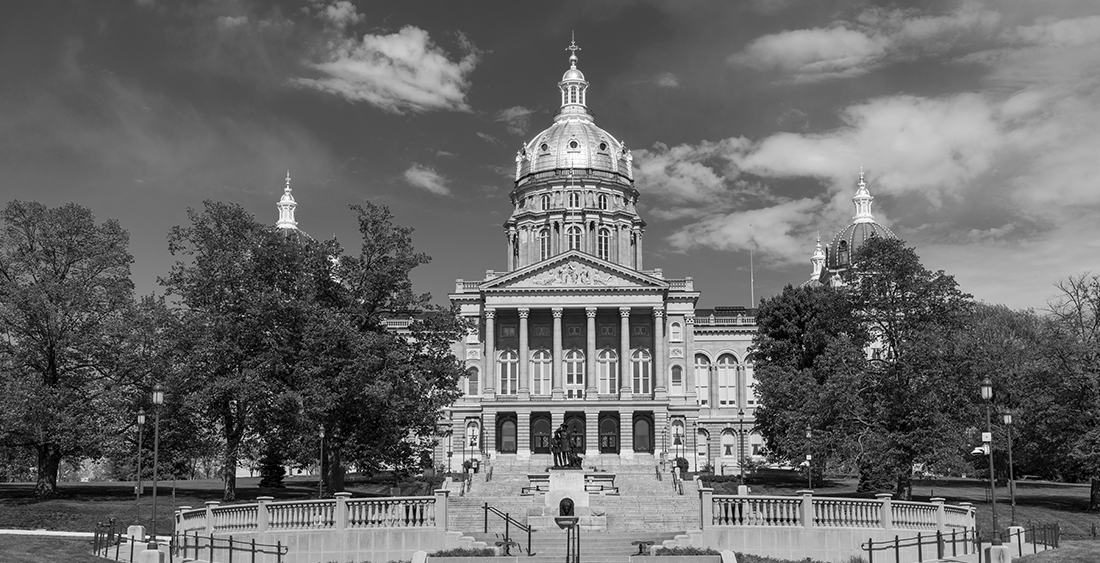The Iowa Legislature adjourned sine die after a 123-day session on May 15. The legislature introduced a total of 2,360 bills, notably far more prior to the funnel deadline than total measures introduced during previous sessions. 176 of those measures made it to the desk of Governor Kim Reynolds (R) for approval, the Governor has until June 14 to sign or veto these measures. Here is what you may have missed:
Pharmacy Benefit Managers
In the absence of federal reform, all 50 states are currently considering some kind of PBM reform. Over the last decade, more than 200 pharmacies closed in the state, many believe this is due to the costs associated with PMBs. Iowa’s SF 383 is a comprehensive reform bill that touches quite a few hot-button areas of PBM regulation, including a focus on pharmacy services administrative organizations (PSAOs). These organizations are rarely included in PBM reform, but in the absence of federal regulation, the measures regulating PBMs have grown broader. As written, the measure aims to protect smaller pharmacies, which have spent several years advocating for PBM reform in the state, and directs the Iowa Insurance Division to oversee the PBMs. Opposition to the bill primarily comes from business groups such as the Iowa Association of Business and Industry, Iowa Bankers Association, and the Iowa Business Council. These groups are concerned that this measure will raise healthcare costs for employers and employees. In a joint letter, the groups say, “This legislation is believed to be the largest health care mandate in Iowa history”. Due to the scope of the measure, businesses are concerned that the July 1 enactment date is too soon for such a sweeping change, and is in the middle of the health plan year for many. SF 383 is likely to be signed by Governor Reynolds (R), Governors from both parties have supported PBM reform across the country.
Carryover
In the first year of the biennium, measures that fail to make it to the finish line prior to the May 15 adjournment are still eligible for consideration in Iowa’s 2026 legislative session. Measures that received a lot of attention this session but were not passed include property tax reform bill SF 651 and twin energy policy bills SF 585 and HF 834. Despite major time and energy spent on the topic, property tax bill SF 651 failed to make it out of the legislature, but the measure is primed to be taken up again in 2026. For the last several years, Republicans in the legislature have prioritized property tax reform in the state, and have used the issue as a major campaign platform. Also eligible for consideration in 2026 are Governor Reynolds' proposed twin energy bills, HF 834 and SF 585, which were unsuccessful in crossing the legislative finish line this session. The measures drew negative attention from President Donald Trump despite Governor Reynolds' positive association with the administration. The bill contains a ‘right of first refusal’ provision that allows utility companies that already have facilities and transmission lines in Iowa the right to construct expansion projects for electricity infrastructure. The Assistant U.S. Attorney General cited concerns for higher project costs under this provision, but the Governor maintains that right of first refusal is the “most effective way to ensure that federally registered transmission line projects are built efficiently and reliably.” These measures have been carried over and will likely receive further consideration in the 2026 legislative session.
Budget
The Iowa state government will be using reserve funds to meet spending obligations in the 2026 fiscal year under the budget passed this session. Republican lawmakers say this was anticipated when the legislature approved income tax cuts. In 2024, Governor Kim Reynolds signed a measure speeding up previous income tax cuts, which reduced the individual income tax rate from 5.7% to 3.8% beginning in 2025. House Speaker Pat Grassley says that Republicans chose to make this cut knowing that the move would cause a loss in state financial returns because Iowans had “overpaid” through income taxes in previous years, money that went into the Taxpayer Relief Fund, which currently holds $4 billion. Iowa Democrats are not confident in the strategy of using one-time funds for ongoing expenses. In information obtained from the Iowa Department of Management’s five-year budget projections, the plan would continue to draw money from the state’s reserves, Taxpayer Relief Fund and Economic Emergency Fund in the coming 5 years. The budget taking effect July 1, 2025, includes provisions for increased funding to Iowa’s K-12 and higher education institutions, funding for the Department of Natural Resources to control air pollution in the state, and appropriations for the Department of Health and Human Services to use toward obesity prevention, eligibility determinations for medical assistance, food assistance, and the children’s health insurance program. The budget is currently pending the Governor’s signature.
Looking Forward
Possible topics for a special session depend on the Governor’s actions on the 176 bills on her desk, but she has specifically mentioned taking a more active role in property tax reform. In 2026, Republicans will control the state lawmaking process and agenda setting, as they have since gaining the majority in 2017. Governor Reynolds has announced she does not plan to run for reelection, which positions several high-ranking Republicans, including Speaker Grassley, to become the GOP nominee in 2026.
